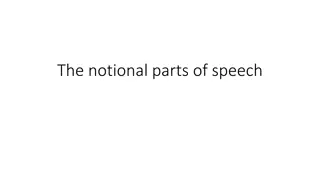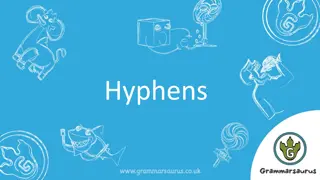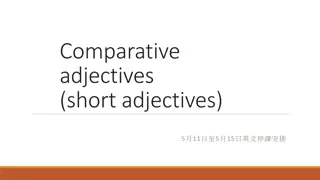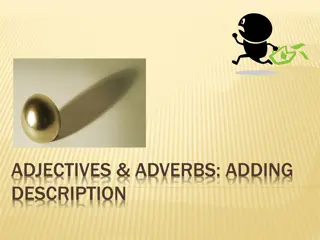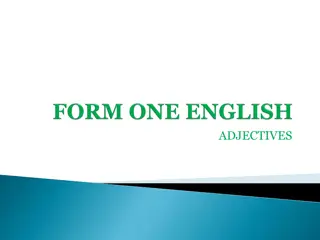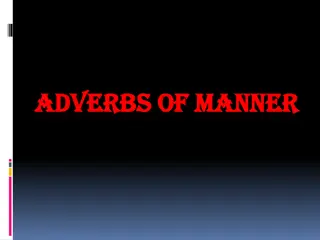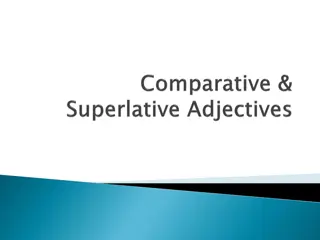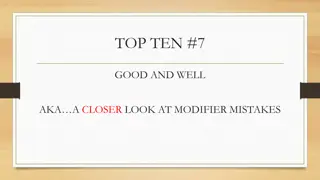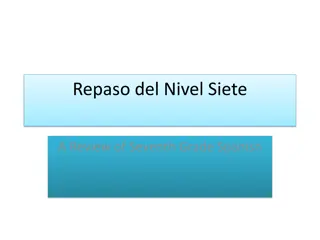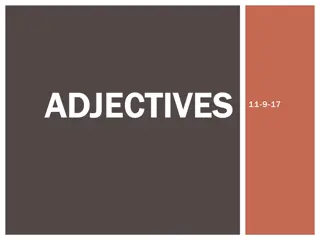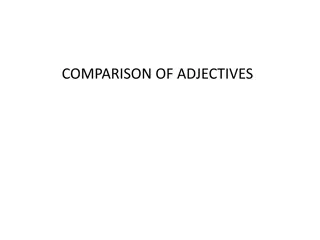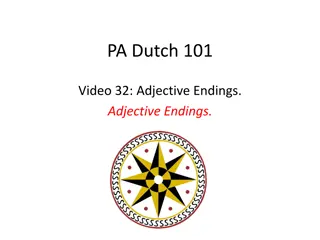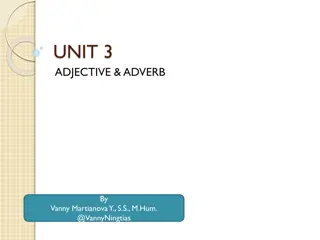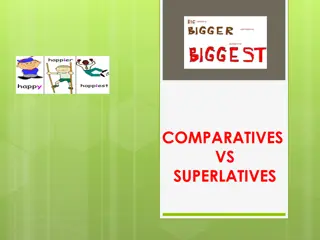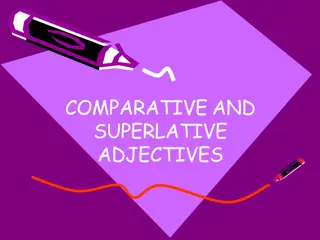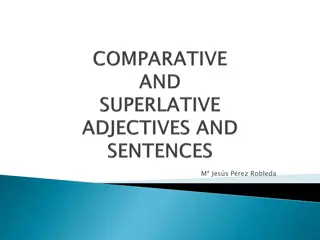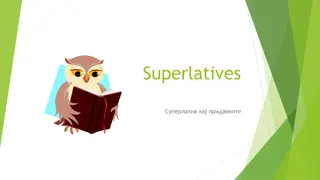Understanding Adjectives: Categories and Examples
Adjectives play a crucial role in language by modifying nouns and pronouns to provide more details and enhance descriptions. This article explores the major categories of adjectives such as color, size, shape, feelings, quantity, qualities, appearance, and condition, with examples for each category. By understanding the diverse types of adjectives, you can enrich your vocabulary and communicate more effectively.
Download Presentation

Please find below an Image/Link to download the presentation.
The content on the website is provided AS IS for your information and personal use only. It may not be sold, licensed, or shared on other websites without obtaining consent from the author. Download presentation by click this link. If you encounter any issues during the download, it is possible that the publisher has removed the file from their server.
E N D
Presentation Transcript
English Language Assistant Prof. Dr. Ahmed A. Mohammed Ph.D. Immunoparasitology University of Salford International-Manchester, UK
Adjectives, Nouns and verbs
What are adjectives? An adjective modifies a noun or a pronoun by describing, identifying, or quantifying words. An adjective often precedes the noun or the pronoun which it modifies. Ex: big, boring, purple, quick and obvious Categories of adjectives The following are the fifteen major categories of meaning that are expressed adjectives. A few examples are listed for each category, but there are several more possibilities. with English
Color blue, red, green, brown, yellow, black, white, purple, pink, etc... Size big, huge, immense, enormous, massive, vast, large, wide, small, little, tiny, high, long, tall, low, short, same as, etc... Shape round (a ball), circle (a door knob), triangular, rectangular (a flag), square (a cake), oval (an egg), broad, curved, flat, etc...
Feelings: happy, glad, cheerful, pleased, satisfied, delighted, sad, broken, dark, depressed, disappointed, disconsolate, discouraged, displeased, dissatisfied, distressed, down, angry, excited, embarrassed, frightened, etc... Quantity one, two, three, ... first, second, third, ... abundant, empty, heavy, light, numerous, substantial, significant, insignificant etc...
Qualities and appearance: good, excellent, brilliant, fantastic, bad, terrible, awesome, awful, nice, beautiful, pretty, gorgeous, cute, glamorous, elegant, good-looking, handsome, ugly, right, wrong, funny, amusing, entertaining, light, heavy, fat, thin, slim, clean, dirty, filthy, straight, noisy, quiet, still, calm, powerful, nutritious, adorable, adventurous, aggressive, attractive, bloody, exciting, graceful, dull, homely, plain, precious, sparkling, fragile, weak, strong, doubtful, confused, puzzled, cautious, careful, concerned, innocent, guilty, blushing, colorful,
crazy, silly, stupid, foolish, clumsy, intelligent, clever, shy, rich, poor, wild, courageous, brave, helpful, helpless, unhelpful, etc... Condition important, principal, famous, notorious, fictitious, real, true, false, imaginary, alive, dead, odd, weird, unusual, strange, outstanding, impossible, improbable, easy, difficult, closed, open, etc... Weather and temperature cold, warm, hot, cool, rainy, windy, snowy, foggy, sunny, cloudy, stormy, frozen, etc...
Time: late, early, delayed, premature, modern, traditional, old- fashioned, young, old, new, slow, swift, quick, rapid, brief, short, long, etc... Age old, ancient, aged, elderly, ageless, overage, young, juvenile, adolescent, teenage, underage, youthful, etc... Nationality and origin American, Mexican, African, etc... Material wooden, woollen, cottony, fibrous, metallic, bronze, etc...
Purpose (These adjectives usually end in ing ) sleeping bag, frying pan, swinging door, time-saving, driving licence, drying machine, etc... Sound loud, noisy, quiet, screeching, silent, soft, voiceless, etc... If you have a collection of them arrange them as in the following: OSASH.COM Opinion, Size, Age, Shape, Color, Origin, Material
Adjectives, nouns and verbs To read and write academic texts effectively, you need to be familiar with the rather formal vocabulary widely used in this area:
Academic adjectives The following adjectives are best understood and learnt as opposites:
Formality in verbs Academic writing tends to use rather formal verbs to express the writer s meaning accurately. Look at these examples:
Prefixes and suffixes Prefixes change or give the meaning. Suffixes show the meaning or the word class (e.g. noun, verb). Ex: Unsustainable , is an example of a word containing a prefix and suffix. Negative prefixes such as UN-/ IN-/ MIS- and DIS- often give adjectives and verbs a negative meaning: unclear, incapable, misunderstanding, disagree.
A wide variety of prefixesdefine meaning, e.g. PRE- which usually means before , e.g. prehistory, premature. The following are examples of prefixes: auto: by itself co : together ex : (i) previous (ii) outside macro: large micro : small multi : many, over, too much post : later re : again sub : below under : (i) below (ii) not enough
Suffixes Some suffixes like -ION/ -IVE or -LY help the reader find the word class, e.g. noun, verb or adjective. Other suffixes add to meaning, e.g. -FUL or -LESS after an adjective have a positive or negative effect. Ex: thoughtful/ careless.


